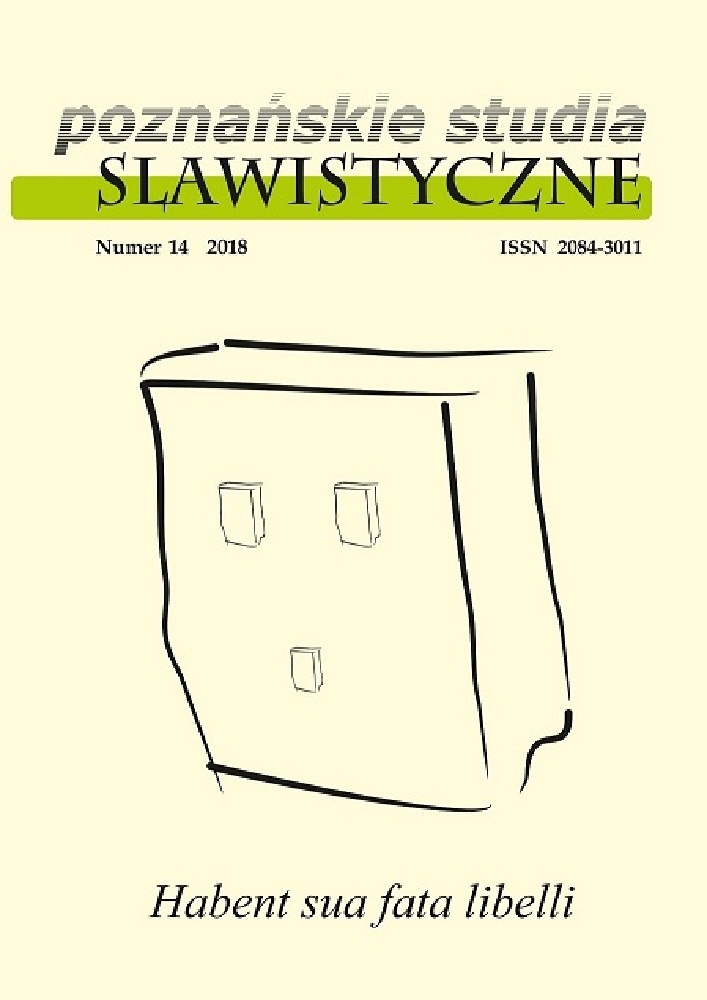Abstrakt
Censorship has often been regarded as the archenemy of artists, thinkers and writers. But has this always been the case? This research paper proposes that censorship is not a total evil or adversarial force which thwarts and hinders twentieth-century writers, particularly those who were part of the artistic, aesthetic, philosophical and intellectual movement known as Modernism. Though the word “censor” originally means a Roman official who, in the past, had a duty to monitor access to writing, the agents of censorship – particularly those in the modern times – are not in every case overt and easy to identify. Though Modernist writers openly condemn censorship, many of them nevertheless take on the role of censors who not only condone but also undergo self-
-censorship or censorship of others. In many cases in Modernist literature, readership and literary production, the binary opposition of victim and victimiser, as well as of censored and censor, is questioned and challenged. This research paper offers an analysis of the ways in which Virginia Woolf (1882–1941), Allen Ginsberg (1926–1997), Czesław Miłosz (1911–2004) and Bohumil Hrabal (1914–1997) lived and wrote by negotiating with many forms of censorship ranging from state censorship, social censorship, political censorship, moral censorship to self-censorship. It is a study of the ways in which these writers problematise and render ambiguity to the seemingly clear-cut and mutually exclusive division between the oppressive censor and the oppressed writer. The selected writers not only criticise and compromise with censorship, but also thematise and translate it into their works.
Bibliografia
Bažant, J. et at. (eds.) (2010). The Czech Reader: History, Culture, Politics. Durham––London: Duke University Press.
Blažek, P. (2012). The Deportation of the King of May: Allen Ginsberg and the State Security. In: BIC: Behind the Iron Curtain: Review of the Institute for the Study of Totalitarian Regimes. Prague: Institute for the Study of Totalitarian Regimes, pp. 35–47.
Coetzee, J.M. (1996). Giving Offense: Essays on Censorship. Chicago: University of Chicago Press.
https://doi.org/10.7208/chicago/9780226111773.001.0001
Collins, R., Skover D.M. (2013). Mania: The Story of the Outraged and Outrageous Lives That Launched a Cultural Revolution. Illinois: Top Five Books.
Češka, J. (2015). Literatura z dosahu politické četby. Za Hrabalovou variantností a ironií. In: M. Wögerbauer, P. Píša, P. Šámal, P. Janáček et al. V obecném zájmu. Censura a sociální regulace literatury v modern české kultuře 1749–2014. Prague: Academia, pp. 1271–1283.
Darnton, R. (2015). Censors at Work: How States Shaped Literature. New York: W.W. Norton.
First Amendment (2017). Legal Information Institute. Cornell Law School. https://www.law.cornell.edu/wex/first_amendment. 03.03.2018.
Ginsberg, A. (1998). Kral Majales. “Massachusetts Review”, vol. 39, issue 2. (Summer). pp. 185–186.
Habermas, J. (1997). Modernity: An Unfinished Project. Eds M. Passerin d’Entrèves, S. Benhabib. Habermas and the Unfinished Project of Modernity: Critical Essays on The Philosophical Discourse of Modernity. Cambridge, Massachusetts: MIT Press, pp. 38–55.
Hall, R. (1968). The Well of Loneliness. London: Corgi.
Hrabal, B. (2014). Total Fears: Letters to Dubenka. Trans. J. Naughton. Prague: Twisted Spoon Press.
Kaplan, K., Tomášek, D. (1994). O cenzuře v Československu v letech 1945–1956. Prague: Institute for Contemporary History of Academy of Science.
Kozák, K. (2016). Joyful Tanks Meet Gay Poet: Commemorating Liberation by ‘America’ in the Age of the Global War on Terror. “RIAS: Review of International American Studies”, vol. 9 (Fall-Winter), No. 2, pp. 87–118.
Krapfl, J. (2013). Revolution with a Human Face: Politics, Culture and Community in Czechoslovakia 1989–1992. New York: Cornell University Press.
https://doi.org/10.7591/cornell/9780801452055.001.0001
Kuhlman, M. (2008). The Silence of the Page Une trop bruyante solitude: The Graphic Novel Adaptation of Too Loud a Solitude by Bohumil Hrabal. “European Comic Art” Vol. 1, No. 2, pp. 157–171.
https://doi.org/10.3828/eca.1.2.5
Marshik, C. (2006). British Modernism and Censorship. New York: Cambridge University Press.
Mellinkoff, A. (2006). Morning Report: Iron Curtain on the Embarcadero. “San Francisco Chronicle” (28 March 1957). Howl on Trial: The Battle for Free Expression. Eds. B. Morgan, N.J. Peters. San Francisco: City Lights Books.
Miłosz, C. (1968). The Novel in Poland. In: Ed. with Intro. H. Peyre. Fiction in Several Languages. Boston: Houghton Mifflin, pp. 105–121.
Miłosz, C. (1981). Nobel Lecture. New York: Farrar Straus Giroux.
Miłosz, C. (1990). The Captive Mind. Trans. J. Zielonko. Vintage International Edition. New York: Vintage.
Miłosz, C. (2002). “Notes on Exile”. To Begin Where I Am: Selected Essays. Ed. with Intro. B. Carpenter, M.G. Levine. New York: Farrar, Straus and Giroux, pp. 13–19.
Nezbeda, O. (2014). Bohumil Hrabal v osidlech censury. Jak komunisté ovládli nejlepšího českého spisovatele. “Respekt”, No. 13. https://www.respekt.cz/tydenik/2014/13/normalizacni-partie-bohumila-hrabala. 03.03.2018.
O’Leary, C. (2011). Introduction. In: Censorship Across Borders: The Reception of English Literature in Twentieth-Century Europe. Eds C. O’Leary, A. Lázaro. New Castle upon Tyne: Cambridge Scholars Publishing, pp. 1–24.
People V. Ferlinghetti. (1957). San Francisco Municipal Court. 3 October 1957.
Potter, R. (2013). Obscene Modernism: Literary Censorship & Experiment 1900–1940. Oxford: Oxford University Press.
https://doi.org/10.1093/acprof:oso/9780199680986.001.0001
Přibáň, M. et al. (2015). Česká literární nakladatelství 1949-1989. Prague: Academia.
Pytlik, R. (2000). The Sad King of Czech Literature Bohumil Hrabal: His Life and Work. Prague: Emporius.
Service, R. (2015). The Penguin History of Modern Russia: From Tsarism to the Twenty-First Century. 4th Ed. London: Penguin.
Suk, J. (2009). ‘A Few Sentences’ on a Petition From 1989. 19.06.2009. https://icv.vlada.cz/en/media-centrum/tema/a-few-sentences-on-a-petition-from-1989-59398/tmplid-676/. 03.03.2018.
Wögerbauer, M., Píša, P., Šámal, P., Janáček, P. et al. (2015). V obecném zájmu. Censura a sociální regulace literatury v modern české kultuře 1749-2014. Prague: Academia.
Woolf, V. (1982). The Diary of Virginia Woolf: Volume 3, 1925–30. Ed. A.O. Bell. Assist. A. McNeillie. Harmondsworth: Penguin.
Woźniak-Łabieniec, M. (2009). Strategie literackie wobec zapisu cenzury. Czesław Miłosz w krajowej prasie i poezji w latach pięćdziesiątych. „Napis”, No. XV. http://rcin.org.pl/Content/54127/WA248_65860_P_I_2795labienec_strategie.pdf. 03.03.2018, pp. 311–326.
Woźniak-Łabieniec, M. (2012). Obecny nieobecny. Krajowa recepcja Czesława Miłosza w krytyce literackiej lat pięćdziesiątych w świetle dokumentów cenzury. Łódź: Wydawnictwo Uniwersytetu Łódzkiego.
Zochr, J. (2014). Allen Ginsberg, spontánní psaní, poezie. [Allen Ginsberg in Olomouc: Allen Ginsberg’s Lecture on Spontaneous Writing with Commentary]. Master’s Thesis (Philology/English Philology). Philosophical Faculty, Palacký University in Olomouc.
Licencja

Utwór dostępny jest na licencji Creative Commons Uznanie autorstwa – Bez utworów zależnych 4.0 Międzynarodowe.
